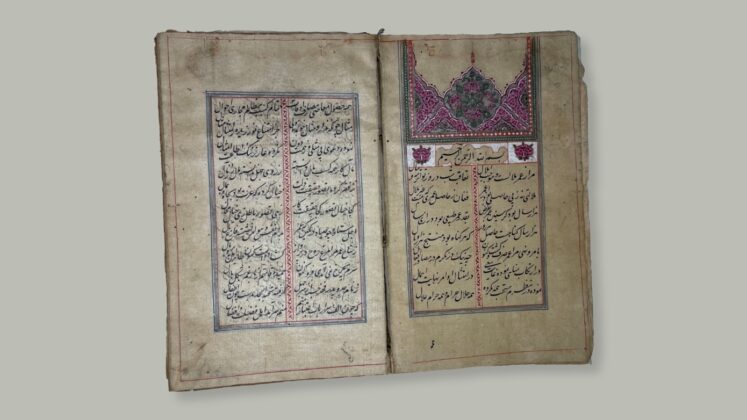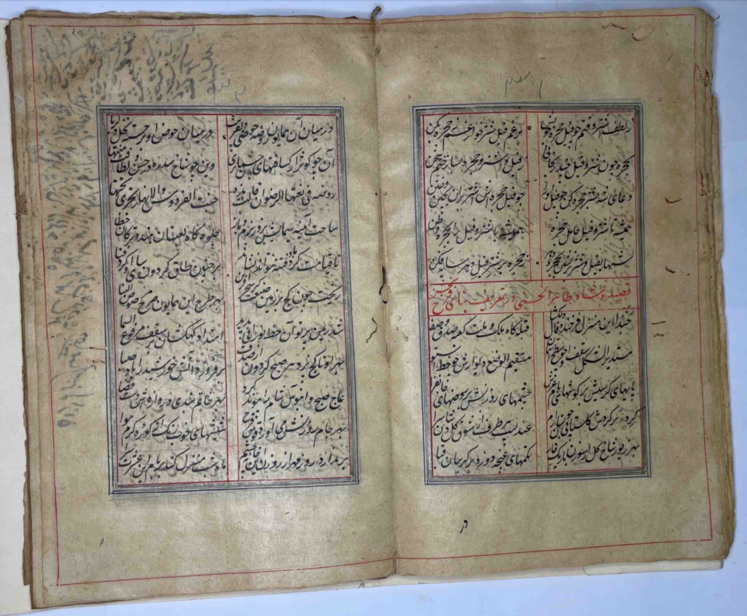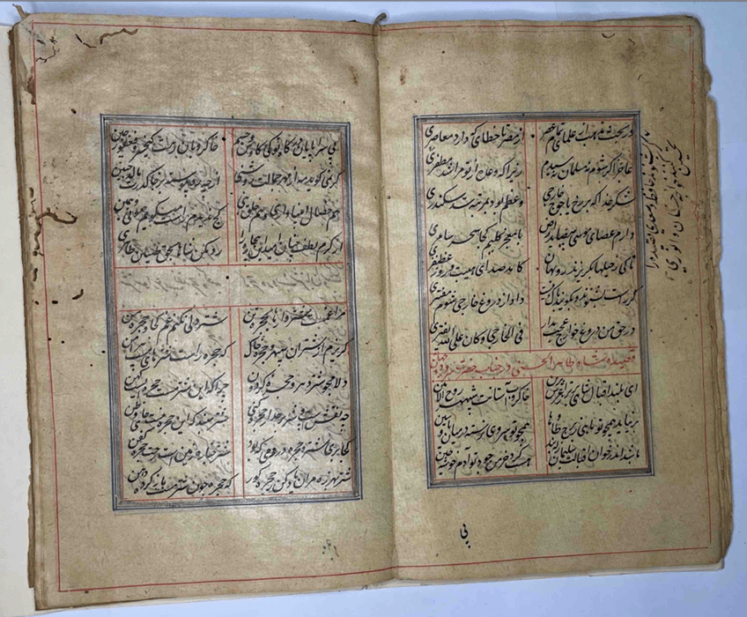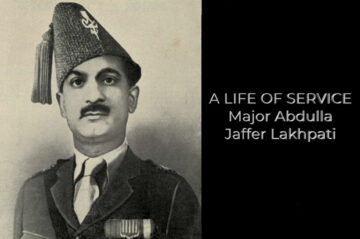A large number of understudied manuscript collections in South Asian archives function as important repositories for historical sources, careful analysis of which can provide critical insights into society, culture, and knowledge practices through hitherto unknown sources. The reconstruction of pre-modern Shi’a Ismaili history in South Asia is greatly dependent on the vast corpus of such manuscripts written in different languages, primarily Persian. The works authored by Shah Tahir Dakhni, an Ismaili Imam belonging to the Muhammad Shahi lineage (d. ca.1546-1549), and preserved in two distinct collections, hold much promise for understanding Deccan’s Muhammad Shahi historical past in the early modern period.
Shah Tahir Dakhni assumed leadership of his community around 915/1509 in Iran. He initially served at the Safavid ruler Shah Ismail’s court and subsequently relocated to Kashan, gathering his followers. His covert adherence to the Shi’a Ismaili faith in taqiyyaPrecautionary dissimulation of one’s religious beliefs, especially in time of persecution or danger, a practice especially adopted by the Shi’i Muslims. raised suspicions. He was forced to relocate, seeking sanctuary in the Deccan region of Hindustan. He settled in Ahmednagar (now in Maharashtra, India) under the cloak of an important Twelver courtier at the Nizam Shahi court. Shah Tahir played a pivotal role in “converting” Burhan Nizam Shah I to Twelver Shi’ism, shaping the relationship between the Deccan Sultanates and Safavid Iran. During his career as an important courtier, Shah Tahir participated in numerous diplomatic missions and penned several works, some of which have been unearthed only recently.
I.K. Poonawala is of the view that only a limited portion of Shah Tahir Hussaini’s literary works has endured the test of time and is subject to differing opinions.¹ Recent discoveries have unveiled extensive collections of Shah Tahir Hussaini’s writings, which encompass a broad spectrum of genres and subjects. Poonawala’s bibliographical compendium mentions a number of manuscripts which carry Shah Tahir’s commentaries on various subjects – jurisprudence, insha, and poetry.² Farhad Daftary’s research sheds light on the existence of Shah Tahir’s “Diwan”, or collection of poetry and compositions, which have been preserved in manuscript form.³
The discovery of over 15 manuscripts containing works attributed to Shah Tahir is of great importance as it provides an opportunity for scholars to explore a more comprehensive range of textual production surrounding Shah Tahir’s literary legacy beyond what was previously known. These newly found works include numerous Qasidas, commentaries on religious literature, poetry, letters of communication, epistolary compositions, and Ghazals. It is important to acknowledge and appreciate the richness and diversity of the literary outputs attributed to Shah Tahir Hussaini, which extends far beyond his poetry and correspondence. These unearthed writings may be able to provide valuable insights into his intellectual contributions and shed light on various facets of his literary prowess, making them a significant addition to aid our understanding of his life in the Deccan.
One notable manuscript, Risala-Majmue (P3016), originating in the Deccan, contains an array of distinctive works: Nan wa Halwa, Qasida-Shah Tahir Hussaini, Sharh-e-Manzum Jami, Masnavi Tuti, Chehel Hadis, and an unidentified text. This manuscript is housed at the State Museum in Hyderabad.
Another compilation of fifteen manuscripts, housed at the Library, Museum, and Document Center of Iran’s Parliament, contains multiple works by Shah Tahir Dakhni, featuring his Qasidas, Monsha’at, Ghazals, Poetry and letters of correspondence:
- قصاید شاه طاهرحسینی (Qasidas by Shah Tahir Hussaini),
- قصاید و غزلیات شاه طاهر دکنی ابن غیاث و صایبا (Qasidas and Ghazals of Shah Tahir Dakhni, Ibn Ghiyath and Saiba)
- مجموعه- اشعار متفرقه از شاعران فارسی زبان، از جمله شاه طاهر دکنی، حافظ، فردوسی ودیگر شعرا (Majmua-Includes writings of Shah Tahir Dakhni)
- شرح دعا السمات از شاه طاهر دكني (Description of Samat Prayer by Shah Tahir Dakhni)
- منشآت Monsha’at (epistolary writings of Shah Tahir Hussaini on p. 151)
- اشعار Ashaar (Poems of Shah Tahir on pp. 214-216)
- اشعار Ashaar (Poems of Shah Tahir on p. 149)
- اشعار- Ashaar (Poems of Shah Tahir on p. 132)
- از مجالس المومنین این اشعار نوشته میشود- Poems collected from the gatherings of believers (Momenin)
- اشعار Ashaar (Collection of poems-Includes writings of Shah Tahir Dakhni)
- اشعار پراکنده Ashaar (Collection of poems from different poets)
- جنگ نثر و نظم-گردآوری محمدتقی بن محمدهادی مازندرانی (Jung Nazm va Nasr Compiled by Mohammad Taghi bin Mohammad Hadi Mazandarani-Including poems of Shah Tahir Hussaini)
- جنگ نظم و نثر (Jung Nazm va Nasr Selection of poems, includes works of Indian poets such as Shah Tahir Hussaini)
- جنگ(گردآورنده: محمدرضا) نامه شاه طاهر دکنی به قاسم بیگ طبیب (Jung-Letters of Shah Tahir Dakhni to Qasim Beig Tabib).
- مجموعه دارای چهارده رساله به نظم (Collection of fourteen treatises in verse including Qasidas and Ghazals of Shah Tahir Hussaini).
This unparalleled discovery of manuscripts has the potential to significantly enhance our understanding of Nizari Ismaili history of South Asia during the early modern era. This newfound collection of works can offer scholars important insight into the society, culture, religion, and politics of the Deccan Sultanates in the 1500s and the Nizari Ismaili environment of the post-Alamut period.
Once the authorship, currently attributed to Shah Tahir, is established by researchers, the distinctiveness of this manuscript compilation presents a multitude of opportunities for scholars of Ismaili studies to conduct new research into the Muhammad Shahi Ismaili history in South Asia.
Footnotes
- Ismail K. Poonawala, “Shāh Ṭāhir”, in: Encyclopaedia of Islam, Second Edition, Edited by: P. Bearman, Th. Bianquis, C.E. Bosworth, E. van Donzel, W.P. Heinrichs, 2012.
- Ismail K. Poonawala and Teresa Joseph, Biobibliography of Ismāʻīlī Literature (Malibu, CA: Undena Publications, 1977), 271-275.
- Farhad Daftary, “Husayni, Shah Tahir b. Radi-al-Din”, in The Bibliographical Encyclopaedia of Islamic Philosophy, ed. Oliver Leaman (London: Continuum International Publishing Group, 2006), 209-211; The MS of Diwan is available with the Ismaili Special Collections Unit at the Institute of Ismaili Studies
References
Daftary, Farhad. “Husayni, Shah Tahir b. Radi-al-Din”, in The Bibliographical Encyclopaedia of Islamic Philosophy, ed. Oliver Leaman, 209-211. London: Continuum International Publishing Group, 2006.
Poonawala, Ismail K. and Joseph, Teresa. Biobibliography of Ismāʻīlī Literature. Malibu, CA: Undena Publications, 1977.: Undena Publications.
Poonawala, Ismail K. “Shāh Ṭāhir”, in: Encyclopaedia of Islam, Second Edition, Edited by: P. Bearman, Th. Bianquis, C.E. Bosworth, E. van Donzel, W.P. Heinrichs, 2012.
About the Authors
Umang Kochhar
Umang Kochhar is a Research Assistant at the Aga Khan Trust for Culture and part of the Qutb Shahi Heritage Park Project in Hyderabad. Umang specialises in early modern South Asia between 1500 and 1800 and has a keen interest in the history of Deccan Sultanates; the Qutb Shahis of Hyderabad, and Golconda. He is interested in the study of the Indian Ocean world with a focus on merchant mobilities, cosmopolitan societies, Columbian exchange, food and art. Umang also offers his services as a Research Consultant to the South Asian Studies Unit-DARP at the IIS. Umang has a Master in Muslim Cultures from the Institute for the Study of Muslim Civilisations, Aga Khan University, London and a Master in Historical Studies from Nalanda University, India.
Kashshaf Ghani
Kashshaf Ghani specialises in pre-modern South Asia between 1000-1800 with a focus on the history of Sufism, its practices, interactions, networks, and regional experiences. He is also interested in Indo-Persian history, cosmopolitan cultures, and Asian interconnections. Kashshaf has held research positions at The Asiatic Society, Kolkata, Universite Sorbonne Nouvelle – Paris, Zentrum Moderner Orient Berlin, Maulana Abul Kalam Azad Institute for Asian Studies Kolkata, and Dialogue Institute at Temple University Philadelphia. His edited works include Exploring the Global South: Voices, Ideas, Histories (2013), and Imagining Asia(s): Networks, Actors, Sites (2019). His forthcoming book from Oxford University Press is titled Sufi Rituals and Practices: Experiences from South Asia 1200-1450. Kashshaf Ghani teaches at the Nalanda University, India.









